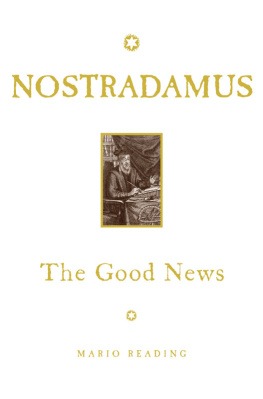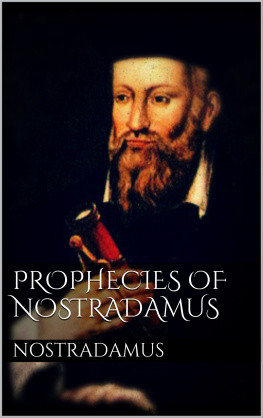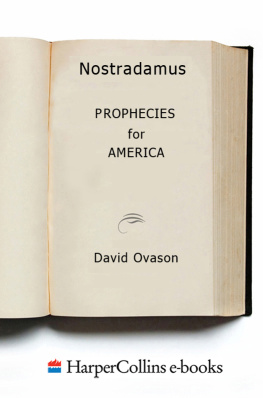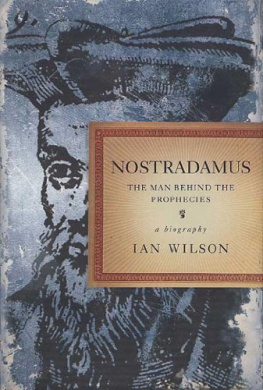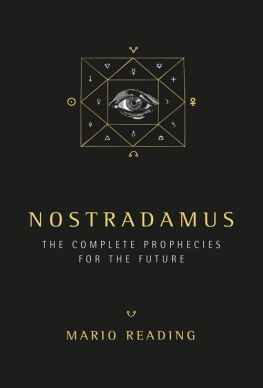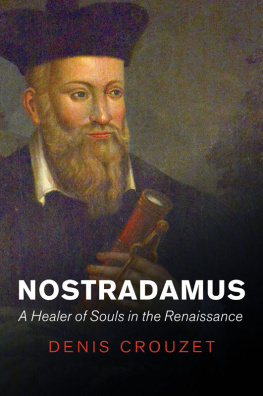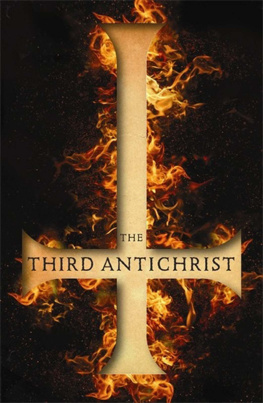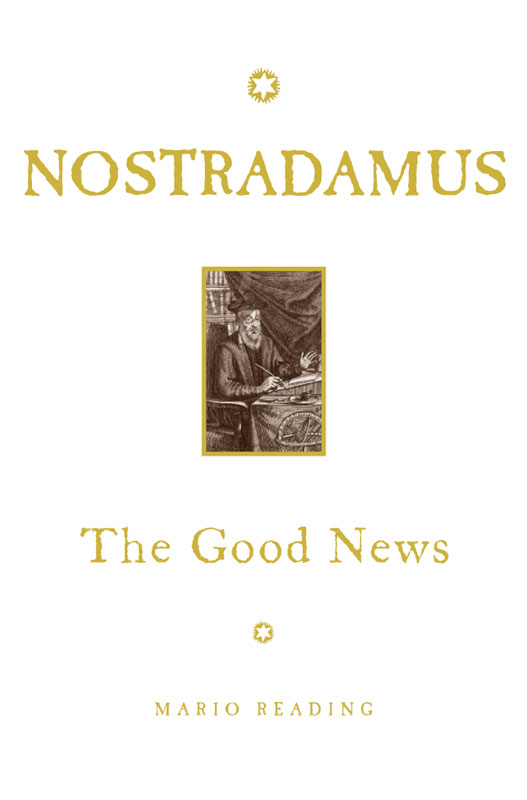
MarioReading was brought up in England, Germany, and the South of France. He speaks four languages. He studied Comparative Literature under Malcolm Bradbury and Angus Wilson at the University of East Anglia, where he specialised in French and German literature and translation. During a passionately misspent youth he sold rare books, taught riding in Africa, studied dressage in Vienna, played professional polo in India, Spain and Dubai, helped run his Mexican wifes coffee plantation, and survived a terminal diagnosis for cancer. An award-winning novelist, he is also the author of the highly personal Dictionary of Cinema (re-issued as The Movie Companion), Nostradamus: The Complete Prophecies for the Future, and The Watkins Dictionary of Dreams.
Nostradamus
The Good News
Mario Reading
Contents
Acknowledgments
As is always the case with books as complex as this one is to proof, edit, and research, I have a number of people to thank for their help during the parturition process: Bert Plusquin, for first taking me to the Great Treasury at Aachen [see quatrain 7/41] and for describing so beautifully how the Allied bombers managed to avoid destroying what is arguably the symbolic cradle of Europe; my editor, Michael Mann, for his consistent friendship and much valued advice; Shelagh Boyd, for both her friendship and her editing skills; Penny Stopa, for her ever-cheerful help with the production details even when I inadvertently filled out one of her authors questionnaires on the wrong book; and finally my wife, Claudia, without whose presence the whole thing wouldnt make any sense anyway.
Habent Sua Fata Libelli
Books Have Their Own Destiny
From Terentianus Mauruss De Litteris Syllabis Et Metris Horatii (Ed: Georgius Galbiatus), Milan, Uldericus Scinzenzeler, 4 February 1497
For my late sister-in-law, Maria Titi del Carmen Fautsch de Villarreal
Introduction
Whenever Ive given radio interviews or appeared on documentaries or news broadcasts in the course of writing about Nostradamus, one question has always thrust itself inexorably to the fore. Was Nostradamus always doom and gloom, or did he ever get around to predicting any good news? Fascinated by this idea, I returned to the complete Nostradamian Centuries and scoured them for any faint inklings of hope. To my immense surprise, I discovered that Nostradamus was a great deal more positive than people give him credit for, and that there was at the very least a good books worth of GoodNews quatrains to be teased out from amongst the horrors and intimations of Armageddon and the End Of Days that recidivist Jonahs and vainglorious commentators have always been so keen to associate with his work.
Good news is, by its very nature, subjective somebodys good news is, after all, frequently only somebody elses worst nightmare. I have tried to get around this inconvenient fact by choosing only quatrains that appear to offer, for the most part at least, generalised good news. But this is not always, of course, possible. My second line of defence, therefore, is to choose quatrains that suggest that the goodies (or at the very least the ethically responsible) will be the eventual winners. I have taken this line because it was Nostradamuss most fundamental belief that if the world could only see into the future, it would wish to alter it benevolently. His prophecies may be construed, therefore, as in part an attempt to communicate across the intervening ages with the world to come, and in further part to cause that world to change itself beforeitistoolate to the advantage of all humanity. As a direct consequence it became inevitable that Nostradamus: The Good News would isolate only those prophecies which suggested such a possibility of creative change, allowing the prophecies, and Nostradamus himself, to be shown, for the first time ever, in an entirely fresh and forward-looking light. These are the prophecies that did and indeed could alter the world for the better.
I should perhaps come clean now and say that people anticipating a simple rehash of previous famous predictions are going to be seriously disappointed, for I have approached each quatrain with entirely fresh eyes, and translated it without any recourse to either earlier translations or erstwhile set-in-stone interpretations. To achieve this end I have occasionally used a technique of my own invention which I call euphonic translation. This technique takes into account the crucial importance, whilst translating Nostradamus, of bearing in mind the actual sound of the line (alongside its more literal, conventional interpretation, needless to say), together with the often hidden meanings potentially contained within those sounds. The fact that many commentators have never cottoned on to this possibility (despite French being the euphonic language that it is!) and have therefore restricted themselves slavishly to the written and often misprinted text they are thinking purely linearly, in other words often limits access to possible meanings which should, and in my opinion, do, inform the whole. The proof, of course, is in the pudding.
In some cases, where either or all possible meanings (the literal, the metaphorical, and the codified) may need to be taken into account, I have put the second, subsidiary (or non-linear) meaning in brackets. A good example occurs in 10/89 1789 [The French Revolution] it comes in line 3, with the word Laqueduict. The word may be taken literally, as a misprinting for LAqueduct (an aqueduct), or it may be taken euphonically as L queux dit (literally, that which was said, by them, there). In my view Nostradamus often signals such bilateral readings by the purposeful misspelling of an obvious word, or its inclusion in a place where its objective reading makes no sense whatsoever (whereas its euphonic reading does). He can then rely on the tunnel vision common to most scholars i.e. that there must be a literal answer to everything, or the world cannot possibly make sense to protect his hidden meanings. I, on the other hand, am neither a scholar, and nor do I feel that the world necessarily needs to make sense (I believe in God He makes sense) I therefore hold no truck whatsoever with such unnecessary and crippling limitations. As a (hopefully enlightened) commentator I am simply out to get as close to Nostradamuss core meaning as possible, and if that involves a few unforced errors, well then, so be it I beg the forgiveness of my readers.
Another thing I entirely fail to understand is why commentators pay such scant attention to Nostradamuss own index numbers. I am speaking of the first and second numbers, separated by a slash, which identify each quatrain the first number refers quite simply to which one of the series of ten (or possibly twelve) groups of a hundred verses it adheres to, whereas the second number, after the slash, would appear to refer to a specific year within a particular lineal, but non-specific (until teased out) century. Is it somehow written in stone that these numbers cannot possibly be right? If so, Ive never discovered the source. Surely Nostradamus would only have needed to conceal dates that occurred within the span of his own lifetime, if the reason for that concealment was to stifle potentially painful inquiries by the Inquisition the rest, by default, wouldnt matter! Usually, but not always, I can then go on to match the index date to circumstances in a matching past or, more speculatively, a future year, and which find themselves reflected more than once (and by preference at least three times) within the quatrain. This done, I then feel able to date the quatrain, and engage on my commentary. It is only when this technique fails, that I ascribe a more tentative index date to the quatrain, based on the historical event or events to which the quatrain would seem to be pointing.

